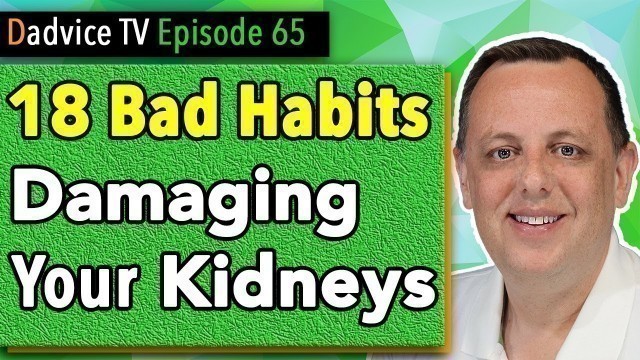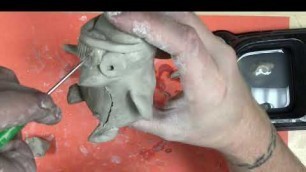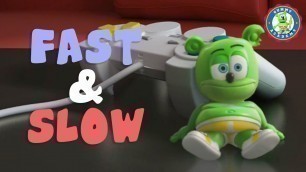

'Episode 65: Improve Kidney Health by avoiding these 18 bad habits that can damage your kidneys, lead to Chronic Kidney Disease or kidney failure. We all have bad habits. What you may not realize is that some bad habits can damage your kidneys and lead to kidney failure. This applies to both those with perfectly healthy kidneys as well as to those with kidney damage who want to improve their kidney health. Here are 18 bad habits that you need to break if you want to improve kidney health. Not Drinking Enough Water Your kidneys need water to process the toxins and waste out of your blood. Not getting enough water reduces your kidney’s ability to do this. In addition, dehydration can quickly cause additional kidney damage. Holding Your Bladder It is important to head the call of nature and not hold it. Holding it puts stress on your kidneys and bladder and can increase your chance of getting painful kidney stones. Too much sodium in your diet Too much sodium in a low potassium diet can cause your blood pressure to increase and can lead to excess water retention, both of which put stress on your kidneys. Not managing High BP Nearly 1/3 of all new cases of Chronic Kidney Disease are caused by uncontrolled high BP. Over time, uncontrolled high blood pressure can cause arteries around the kidneys to narrow, weaken or harden. To compound the problem, your kidneys regulate your BP and damaged kidneys will put you in a negative spiral of ever-worsening BPe. Eventually, your kidneys will fail from uncontrolled blood pressure. Use a home monitoring device, like the Withings BPM Connect to help manage your BP. Not proactively managing Diabetes Diabetes is the most common cause of kidney failure in the United States. About 1 out of 4 adults with diabetes have Kidney Disease. Being Obese or Overweight Living a Sedentary lifestyle Sitting for long periods of time has now been linked to the development of kidney disease. Not getting enough sleep Not quitting smoking - You know it\'s bad and quitting is tough, but it is important to stop. Ask your doctor for available programs to help break this bad habit. Over-use of painkillers Non-steroidal anti-inflammatory drugs (NSAIDs) have been shown to cause kidney damage with high dosages or long-term use. 3-5% of new cases of Chronic Kidney Disease come from the overuse of painkillers. Consuming Excessive Caffeine People who consume a lot of caffeine (whether it be from coffee, energy drinks, chocolate, etc.) are increasing their BP and putting stress on their kidneys. For those who already have kidney damage, this expedites additional damage. Now the key to this bad habit is consuming a LOT of caffeine. Recent studies have shown that drink a few cups of coffee a day is beneficial to those with Chronic Kidney Disease as long as their BP is managed. Poor Nutrition Nutrition plays an important role in Kidney Disease outcomes. For those who already have kidney problems, not getting the right amount of right nutrients can accelerate kidney problems. The standard nutritional guidelines are not appropriate for kidney patients, so kidney patients should work with a renal dietitian. A renal dietitian will help ensure you are getting the right nutrients from your diet, including supplements. Eating Too Much Animal Protein Excessive amounts of Animal protein (the kind found in meat, eggs, and dairy) can be tough for your kidneys to process and causes your kidneys to go into hyperfiltration mode for several hours. This extra stress can cause damage to your kidneys and worsen any existing kidney damage. Animal protein also generates high amounts of acid that can be harmful to the kidneys. Eating Processed Foods Eating too many sweets A study confirmed that consuming too much fructose could bring a rise in uric acid levels and ultimately lead to cardiorenal disease. Drinking Sodas Self-Prescribing Supplements IMPORTANT: I AM NOT A DOCTOR. Patients should always be under the care of a physician and defer to their physician for any and all treatment decisions. This video is not meant to replace a physician\'s advice, supervision, and counsel. No information in the video should be construed as medical advice. All medical decisions should be made by the patient and a qualified physician. This video is for informational purposes only and DOES NOT CONSTITUTE THE PROVIDING OF MEDICAL ADVICE. #DadviceTV #KidneyHealth #KidneyDisease #kidney #KidneyFailure #FightCKD'
Tags: kidney disease , kidney , kidney health , CKD , chronic kidney disease , kidney health tips , improve kidney function , kidney damage , renal diet , reverse kidney disease , improve kidney health , Prevent Kidney Failure , kidney health diet , kidney nutrition , improve kidney health naturally , prevent kidney disease , bad habits for kidney health , improve kidney health diet , improve kidney , improve kidney gfr , reverse kidney damage , Signs your kidneys are crying for help
See also:


!['Stray Kids – Charmer [ПЕРЕВОД НА РУССКИЙ/КИРИЛЛИЗАЦИЯ Color Coded Lyrics]'](https://cdn-img01.kidsbigvlog.com/images/11-m/145/1451489_m.jpg)










comments